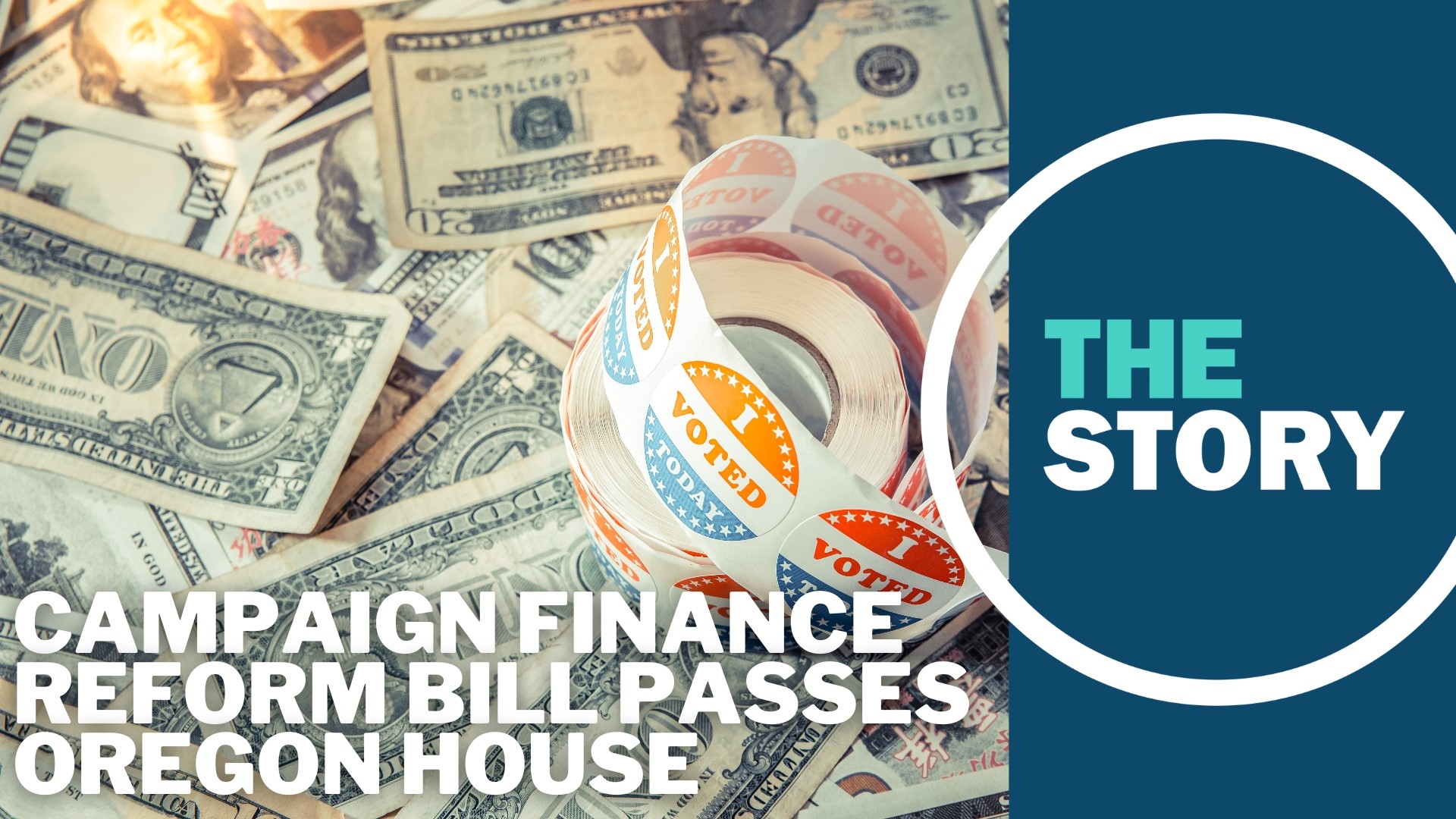SALEM, Ore. — In Oregon's last election for governor, more than $70 million was spent trying to convince voters which candidate to vote for. Oregon is one of the last states in the country with no laws limiting the amount of money campaigns can get and who they get it from.
That is on the verge of changing with House Bill 4024.
On Wednesday morning, the Oregon House Rules Committee hammered out a compromise among Democrats, Republicans, good government groups and campaign donors. By the afternoon, the bill passed the Oregon House with a 52-5 vote.
Though lip service for campaign finance reform has been bandied about, the Oregon Legislature has actually never passed caps on campaign contributions. However, it has repealed voter-enacted limits several times, the first being in 1908, when Oregon voters first enacted limits by statewide initiative.
'A huge step forward for our state'
Jason Kafoury is an attorney from Portland and one of the leaders of Honest Elections Oregon, a group that earnestly pushed for the bill.
"I'm pleased that we're finally getting to a place where good government groups could find it. I would say acceptable enough as a starting point and a big starting point ... this is a huge step forward for our state," he declared, praising grassroots activists for their 30 years of hard work.
"We've been the Wild West for way too long — no limits on any political contributions — and I don't think that's the Oregon way. I really don't: we ranked in 2016 second-to-last in how we finance our campaigns by the Center for Public Integrity. Only Mississippi was lower; we were 49th of 50th, and I think we'll finally move out of that category after this," Kafoury concluded.
The politicians from both parties praised the deal, agreeing that it's about time.
House Majority Leader Julie Fahey, D-Eugene, lauded the rare bipartisan communication, saying, "First, I want to thank everyone who has come to the table and participated in good faith to come to this compromise.
"As I've said before in this committee, we have seen too many years of entrenched positions and conflict around campaign finance reform. But in the last few weeks, we've seen remarkable willingness by all sides to engage, listen and focus on the good policy for the people of Oregon," Fahley said.
House Minority Leader Jeff Helfrich, R-Hood River, agreed.
"Those opinions were heard; those opinions were mashed through and ended up on a piece of paper that people agreed to," he said. "I think, moving forward, we show Oregonians that the legislative body can work and get good policy out there.
"It's not perfect; we understand nothing is perfect. But we have the ability to get people to come to the table and have a conversation to move issues forward," he concluded.
What will it do?
First off, campaign finance limits will not kick in until Jan. 2027.
Overall, the bill's language states that it will create "campaign giving and spending limits and new disclosure laws on campaign giving and spending," including for candidates, political committees and membership organizations — i.e. nonprofit groups formed by business interests, advocacy groups or other interested parties.
One of the big things it will do is stop folks like Nike founder Phil Knight from writing big checks directly to the candidates. He gave unaffiliated candidate Betsy Johnson $3.75 million and Republican candidate Christine Drazan $1.5 million during the 2022 gubernatorial race. The new limit for donations from an individual would be $3,300.
It would also prohibit unions from spending huge amounts, such as when labor union Service Employees International Union (SEIU) gave Kotek $1.7 million in that same race.
For local elections, its local government can establish limits. Meanwhile, statewide candidates from membership organizations will be limited to getting $26,400 per election, not $33,000. Membership organizations can give legislative or local candidates $13,200.
Campaigns must also submit expenditure reports, such as where the original sources of funding came from. There are exceptions: campaigns do not need to report for donations that are under $5,000. Meanwhile, it also requires incumbents who want to seek reelection for public office to file nominating petitions or declarations of candidacy at least seven days before the filing deadline to newcomers.
The bill also outlines steps to take if the act is violated or candidates do not submit their statements in time, such as the secretary of state imposing a civil penalty.
On the advertising side, the bill requires the "disclosure of specified information on certain political advertising."
The secretary of state will also hire a full-time employee to "provide voter education, support and outreach regarding Oregon’s campaign finance laws." The secretary of state will create a campaign-finance dashboard online, which will transparently disclose campaign contributions and independent expenditures.
What comes next?
It'll go to the Senate, and if it passes there, will head to Gov. Kotek's desk. She will then decide whether or not to sign it into law.

